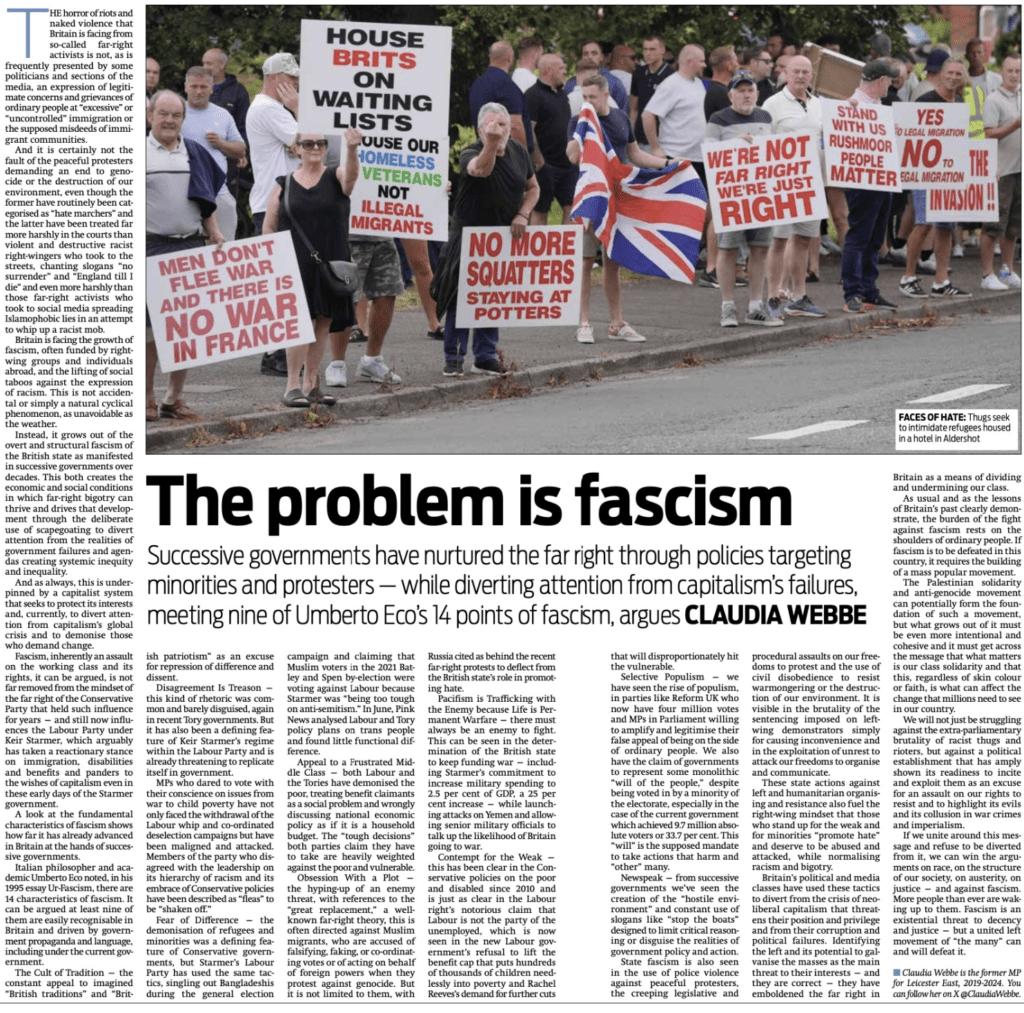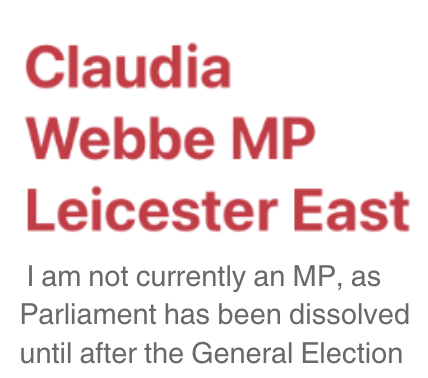
The problem is fascism
By Claudia Webbe
Successive governments have nurtured far-right sentiment through policies targeting minorities and protesters, while diverting attention from capitalism’s failures, meeting nine of Umberto Eco’s 14 points of fascism, argues CLAUDIA WEBBE
THE horror of riots and naked violence that Britain is facing from so-called far-right activists is not, as is frequently presented by some politicians and sections of the media, an expression of legitimate concerns and grievances of ordinary people at “excessive” or “uncontrolled” immigration or the supposed misdeeds of immigrant communities.
And it is certainly not the fault of the peaceful protesters demanding an end to genocide or the destruction of our environment, even though the former have routinely been categorised as “hate marchers” and the latter have been treated far more harshly in the courts than violent and destructive racist right-wingers who took to the streets, chanting slogans “no surrender” and “England till I die” and even more harshly than those far-right activists who took to social media spreading Islamophobic lies in an attempt to whip up a racist mob.
Britain is facing the growth of fascism, often funded by right-wing groups and individuals abroad, and the lifting of social taboos against the expression of racism. This is not accidental or simply a natural cyclical phenomenon, as unavoidable as the weather.
Instead, it grows out of the overt and structural fascism of the British state as manifested in successive governments over decades. This both creates the economic and social conditions in which far-right bigotry can thrive and drives that development through the deliberate use of scapegoating to divert attention from the realities of government failures and agendas creating systemic inequity and inequality.
And as always, this is underpinned by a capitalist system that seeks to protect its interests and, currently, to divert attention from capitalism’s global crisis and to demonise those who demand change.
Fascism, inherently an assault on the working class and its rights, it can be argued, is not far removed from the mindset of the far right of the Conservative Party that held such influence for years — and still now influences the Labour Party under Keir Starmer, which arguably has taken a reactionary stance on immigration, disabilities and benefits and panders to the wishes of capitalism even in these early days of the Starmer government.
A look at the fundamental characteristics of fascism shows how far it has already advanced in Britain at the hands of successive governments.
Italian philosopher and academic Umberto Eco noted, in his 1995 essay Ur-Fascism, there are 14 characteristics of fascism. It can be argued at least nine of them are easily recognisable in Britain and driven by government propaganda and language, including under the current government.
The Cult of Tradition — the constant appeal to imagined “British traditions” and “British patriotism” as an excuse for repression of difference and dissent.
Disagreement Is Treason — this kind of rhetoric was common and barely disguised, again in recent Tory governments. But it has also been a defining feature of Keir Starmer’s regime within the Labour Party and is already threatening to replicate itself in government.
MPs who dared to vote with their conscience on issues from war to child poverty have not only faced the withdrawal of the Labour whip and co-ordinated deselection campaigns but have been maligned and attacked. Members of the party who disagreed with the leadership on its hierarchy of racism and its embrace of Conservative policies have been described as “fleas” to be “shaken off.”
Fear of Difference — the demonisation of refugees and minorities was a defining feature of Conservative governments, but Starmer’s Labour Party has used the same tactics, singling out Bangladeshis during the general election campaign and claiming that Muslim voters in the 2021 Batley and Spen by-election were voting against Labour because Starmer was “being too tough on anti-semitism.” In June, Pink News analysed Labour and Tory policy plans on trans people and found little functional difference.
Appeal to a Frustrated Middle Class — both Labour and the Tories have demonised the poor, treating benefit claimants as a social problem and wrongly discussing national economic policy as if it is a household budget. The “tough decisions” both parties claim they have to take are heavily weighted against the poor and vulnerable.
Obsession With a Plot — the hyping-up of an enemy threat, with references to the “great replacement,” a well-known far-right theory, this is often directed against Muslim migrants, who are accused of falsifying, faking, or co-ordinating votes or of acting on behalf of foreign powers when they protest against genocide. But it is not limited to them, with Russia cited as behind the recent far-right protests to deflect from the British state’s role in promoting hate.
Pacifism is Trafficking with the Enemy because Life is Permanent Warfare — there must always be an enemy to fight. This can be seen in the determination of the British state to keep funding war — including Starmer’s commitment to increase military spending to 2.5 per cent of GDP, a 25 per cent increase — while launching attacks on Yemen and allowing senior military officials to talk up the likelihood of Britain going to war.
Contempt for the Weak — this has been clear in the Conservative policies on the poor and disabled since 2010 and is just as clear in the Labour right’s notorious claim that Labour is not the party of the unemployed, which is now seen in the new Labour government’s refusal to lift the benefit cap that puts hundreds of thousands of children needlessly into poverty and Rachel Reeves’s demand for further cuts that will disproportionately hit the vulnerable.
Selective Populism — we have seen the rise of populism, in parties like Reform UK who now have four million votes and MPs in Parliament willing to amplify and legitimise their false appeal of being on the side of ordinary people. We also have the claim of governments to represent some monolithic “will of the people,” despite being voted in by a minority of the electorate, especially in the case of the current government which achieved 9.7 million absolute voters or 33.7 per cent. This “will” is the supposed mandate to take actions that harm and “other” many.
Newspeak — from successive governments we’ve seen the creation of the “hostile environment” and constant use of slogans like “stop the boats” designed to limit critical reasoning or disguise the realities of government policy and action.
State fascism is also seen in the use of police violence against peaceful protesters, the creeping legislative and procedural assaults on our freedoms to protest and the use of civil disobedience to resist warmongering or the destruction of our environment. It is visible in the brutality of the sentencing imposed on left-wing demonstrators simply for causing inconvenience and in the exploitation of unrest to attack our freedoms to organise and communicate.
These state actions against left and humanitarian organising and resistance also fuel the right-wing mindset that those who stand up for the weak and for minorities “promote hate” and deserve to be abused and attacked, while normalising racism and bigotry.
Britain’s political and media classes have used these tactics to divert from the crisis of neoliberal capitalism that threatens their position and privilege and from their corruption and political failures. Identifying the left and its potential to galvanise the masses as the main threat to their interests — and they are correct — they have emboldened the far right in Britain as a means of dividing and undermining our class.
As usual and as the lessons of Britain’s past clearly demonstrate, the burden of the fight against fascism rests on the shoulders of ordinary people. If fascism is to be defeated in this country, it requires the building of a mass popular movement.
The Palestinian solidarity and anti-genocide movement can potentially form the foundation of such a movement, but what grows out of it must be even more intentional and cohesive and it must get across the message that what matters is our class solidarity and that this, regardless of skin colour or faith, is what can affect the change that millions need to see in our country.
We will not just be struggling against the extra-parliamentary brutality of racist thugs and rioters, but against a political establishment that has amply shown its readiness to incite and exploit them as an excuse for an assault on our rights to resist and to highlight its evils and its collusion in war crimes and imperialism.
If we unite around this message and refuse to be diverted from it, we can win the arguments on race, on the structure of our society, on austerity, on justice — and against fascism. More people than ever are waking up to them. Fascism is an existential threat to decency and justice — but a united left movement of “the many” can and will defeat it.
Claudia Webbe MP is the former member of Parliament for Leicester East (2019-24). You can follow her at www.facebook.com/claudiaforLE and twitter.com/ClaudiaWebbe


